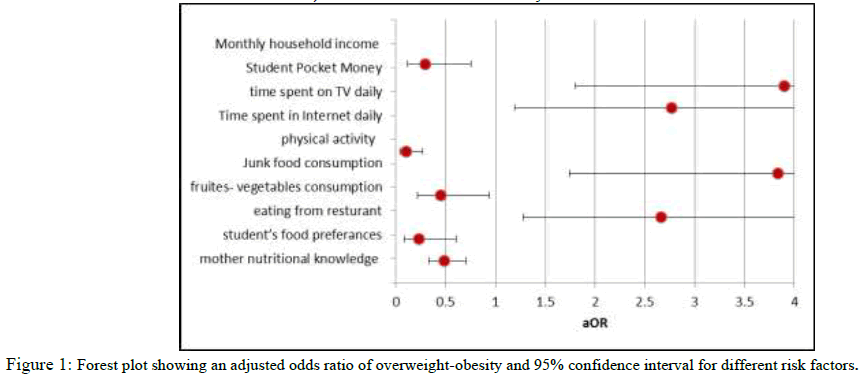Effect of Nutritional Knowledge and Food Preference on Obesity
Received: 08-Sep-2020 / Accepted Date: 18-Sep-2020 / Published Date: 25-Sep-2020 DOI: 10.4172/2168-9652.1000268
Childhood obesity is a major public health challenge of the 21st century, with lifelong health consequences.
The Objectives are: (1) to assess the effect of the child’s knowledge of food, and food preferences on the child’s body mass index (BMI). (2) to investigate the relationship between the child’s BMI and the mother’s nutritional knowledge and attitude towards healthy food.
Data gathering was carried out from November 2017 to February 2018. A multistage stratified collection random sample technique was used. Four schools were selected based on size and equal numbers of participants were included from each cluster. From each grade, one class was selected randomly. Out of total 442 students measured BMI, A total of 116 cases and 232 controls were included in the study. The weight and height were recorded, BMI calculated, and the students were divided into obese/ overweight group and the normal weight group from which cases and control randomly selected thereafter. Data were collected by face to face interview with the girl, and a self-administrated questionnaire was sent to the student's mother Results were presented as adjusted Odds Ratio (aOR) and 95% confidence intervals (CI).
After regulating for the confusing variables, more healthy food preferences in children and higher mother's knowledge were related with 77% and 51% reduced odds of obesity (aOR = 0.23 95% CI 0.09–0.64 and aOR = 0.49 95% CI 0.33–0.71) Figure 1.
Healthy food preferences among girls and suitable nutritional knowledge among their mothers were significantly associated with decreased obesity in girls. Eating healthy food and staying fit are important irrespective of age group. Growing older our bodies have different needs, so certain nutrients become especially important for good health.
Adults need additional calcium and vitamin D to aid maintain bone health. To meet these requirements, selected calcium-rich foods and beverages and low-fat or fat-free dairy products, fortified cereals and fruit juices, dark green leafy vegetables, canned fish with soft bones, and fortified plant-based beverages required in diet which are good sources of vitamin D. Furthermore, fortified cereal, fish and seafood are sources of vitamin B12 as people older than 50 may not be able to absorb enough vitamin B12. Eat fiber-rich nutriments to stay steady. Dietary fiber also helps lower heart related risk and reduce your risk for Type II diabetes. Whole-grain breads and cereals, beans and peas along with fruits and vegetables in diet also provide dietary fiber.
Consuming suitable potassium, along with limiting sodium (salt) intake, may lower your risk of high blood pressure. Most of the fats should be polyunsaturated and monounsaturated fats, which are primarily found in nuts, seeds, avocados, vegetable oils and fish. Pick foods that are low in saturated fat and trans-fat to help reduce your heart disease risk.
Citation: Vishakha S (2020) Effect of Nutritional Knowledge and Food Preference on Obesity. Biochem Physiol 9: 268. DOI: 10.4172/2168-9652.1000268
Copyright: © 2020 Vishakha S. This is an open-access article distributed under the terms of the Creative Commons Attribution License, which permits unrestricted use, distribution, and reproduction in any medium, provided the original author and source are credited.
Share This Article
Recommended Journals
Open Access Journals
Article Tools
Article Usage
- Total views: 1548
- [From(publication date): 0-2020 - Nov 21, 2024]
- Breakdown by view type
- HTML page views: 971
- PDF downloads: 577

